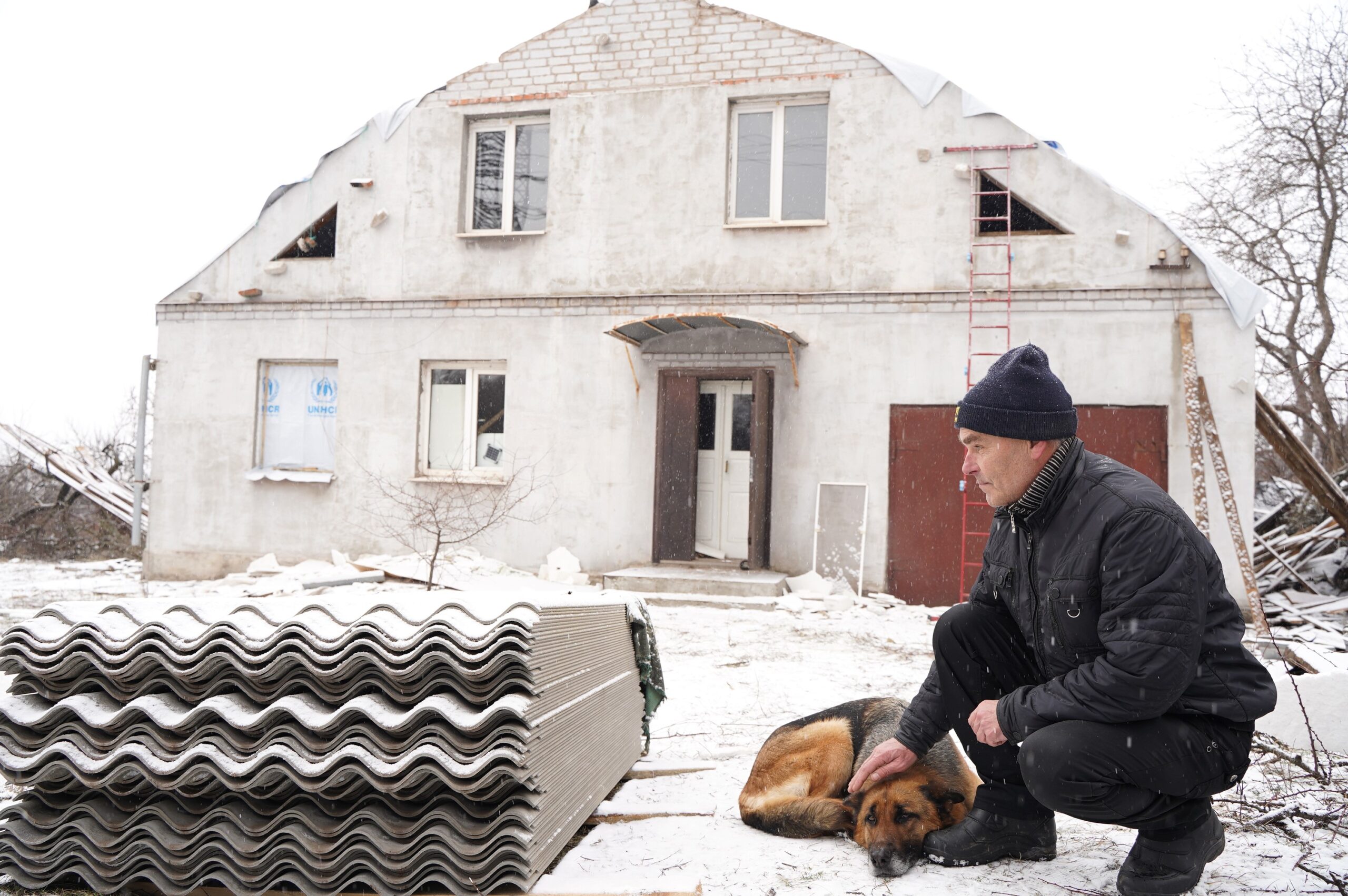With timely and generous support from the European Union, UNHCR and partners rush to provide emergency shelter materials to help people quickly repair their homes damaged by Russian aerial attacks.

With shelter materials provided by UNHCR, Serhii is rebuilding his home that was damaged by a missile attack in Kryvyi Rih. ©UNHCR/Iryna Tymchyshyn
A huge crater in his garden is a daily reminder of the most terrifying morning that Serhii has experienced during his 57 years. On 8 January 2024, the city Kryvyi Rih in Ukraine’s Dnipropetrovsk region where he lives was targeted by Russian missiles, one of which landed on Serhii’s land.
“I was desperate, I did not understand what had happened. The windows and doors were blown out. I tried to hide in the restroom and one of the doors hurt my leg. It’s a miracle that I am alive. It was just a matter of seconds. I could not stay at the house which was significantly damaged. Just imagine, it was minus ten degrees outside, no roof, no doors, no windows… When the shock receded, I began rebuilding my home,” Serhii says.
Serhii was injured by the shelling while his house and other property were severely damaged. Responding to this attack, UNHCR, the UN Refugee Agency, and its Ukrainian NGO partner Proliska provided emergency shelter assistance to Serhii to help him quickly seal the broken windows and holes in the roof and walls so he could remain in his home and work on the more substantial repairs required. He also received essential aid items, psychosocial support as well as legal assistance on how to apply for the state compensation paid to owners of damaged houses from UNHCR’s local NGO partner .
In close coordination with local authorities and in cooperation with local partners, UNHCR delivers such assistance across Ukraine, not least in the areas that suffer from regular attacks, most often in the eastern and southern regions of Ukraine. Each emergency shelter kit from UNHCR includes materials and tools, such as tarpaulin, wooden boards, nails, plastic sheets and foam. Using these, people can protect their homes from the cold and precipitation and secure the structures until more advanced repairs can take place. Immediately after attacks, UNHCR and its partners send their teams to provide emergency assistance on-site which, in addition to these shelter materials, includes psychosocial support, essential aid items and cash assistance.
Support to residents of multi-storey buildings
In the second largest city of Ukraine, Kharkiv, hardly a day goes by without a devastating aerial attack that leaves in its wake shattered lives and damaged homes. The signs of shelling are visible everywhere: black holes in the walls and broken windows have become the usual scenery in Kharkiv. The multi-storey buildings that are home to hundreds of people are heavily impacted.
One of such attacks in January 2024 severely damaged the apartment of 82-year-old Valentyna, living at the top floor. Even though the broken windows were swiftly closed with wooden boards provided by UNHCR’s local NGO partner Proliska, the cold crept in through the cracks in the roof, forming icicles on the ceiling and making the apartment uninhabitable. Valentyna and her husband were forced to move out and stay with their relatives. She still visits her house regularly to empty the buckets of water coming through the roof. To help her overcome the trauma and start the complex process of applying for state compensation, Proliska provided Valentyna with psychosocial and legal assistance.
“I was born in 1942 and my mother told me how she hid me in a cellar during the Second World War. I hope to stay alive a little bit more and not die now,” Valentyna said.
According to the updated Rapid Damage and Needs Assessment report published by the World Bank, the Government of Ukraine, the European Union, and the United Nations, about 2 million homes in Ukraine have been damaged or destroyed since 24 February 2022. Donetsk, Kharkiv and Kherson regions are the regions where UNHCR and its partners have provided most emergency shelter assistance in 2023. Overall, since the start of Russia’s full-scale invasion of Ukraine, over 285,000 people have received emergency shelter materials from UNHCR and its NGO partners. This is possible thanks to generous funding of the European Union.
Share on Facebook Share on Twitter